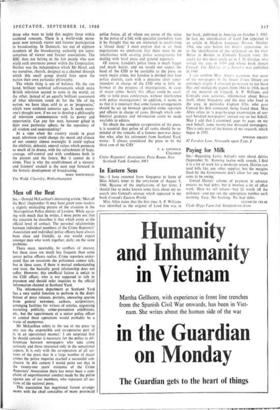Men off the Beat
Stn,—Donald McLachlan's interesting article, 'Men off the Beat' (September 9) may have given your readers a slightly misleading picture of the situation in the Metropolitan Police district of London. While agree- ing with much that he writes, I must point out that the situation he describes is that which exists at the official level of contact. The personal relationships between individual members of the Crime Reporters' Association and individual police officers have always been close and friendly, as one would expect amongst men who work together, daily, on the same problems.
There must, inevitably, be conflicts of interest, but these cases are much less frequent than some senior police officers realise. Crime reporters under- stand that on occasions the policeman cannot talk, but in these cases, if there is mutual understanding and trust, the basically good relationship does not suffer. However, this unofficial liaison is unfair to the CID officer, who is not supposed to talk to pressmen and should refer inquiries to the official information channel at Scotland Yard.
The information department at Scotland Yard has a very useful function to perform in the distri- bution of press releases, pictures, answering queries from general newsmen, authors, scriptwriters, arranging facilities for writers of articles, organising recruiting publicity, crime-prevention exhibitions, etc., but the appointment of a senior police officer to control these operations would probably be a waste of manpower.
Mr McLachlan refers to the use of the press 'at any rate the responsible and co-operative part of it, in an operational manner.' I am surprised that he should consider it necessary for the police to dif- ferentiate between newspapers who take crime seriously and those interested only in the sensational aspects. It is only with the co-operation of all sec- tions of the press that in a large number of major crimes the police inquiries reached a successful con- clusion. In this context I would point out that in the twenty-one years' existence of the Crime Reporters' Association there has never been a com- plaint of unprofessional conduct made by the police against any of our members, who represent all sec- tions of the national press.
This association has negotiated liaison arrange- ments with the chief constables of many provincial
police forces, all of whom are aware of the value to the police of a link with specialist journalists. Lest it be thought that we are interested in establishing a 'closed shop,' I must explain that in all these negotiations we emphasise that there must be no interference with existing police arrangements for dealing with local press and general reporters.
Of course, London's police force is much bigger and much busier, and we would not expect the head of the CID to be available to the press on every major crime, but London is divided into four police districts, each with a detective chief super- intendent in charge of the CID who is fully in- formed of the progress of investigations, in cases of major crime. Surely this officer could be avail- able to hold press conferences, without interference with police investigations? In addition, it seems to us that it is necessary that some liaison arrangements should be set up between specialist crime reporters and officers in charge of cases, through which con- fidential guidance and information could be made available to editors.
To obtain the complete co-operation of the press, it is essential that police of all ranks should be re- minded of the remarks of a famous post-war detec- tive who, after his retirement from Scotland Yard, wrote: 'I always considered the press to be the third arm of the CID.'
Scotland Yard, London, SWI


































 Previous page
Previous page